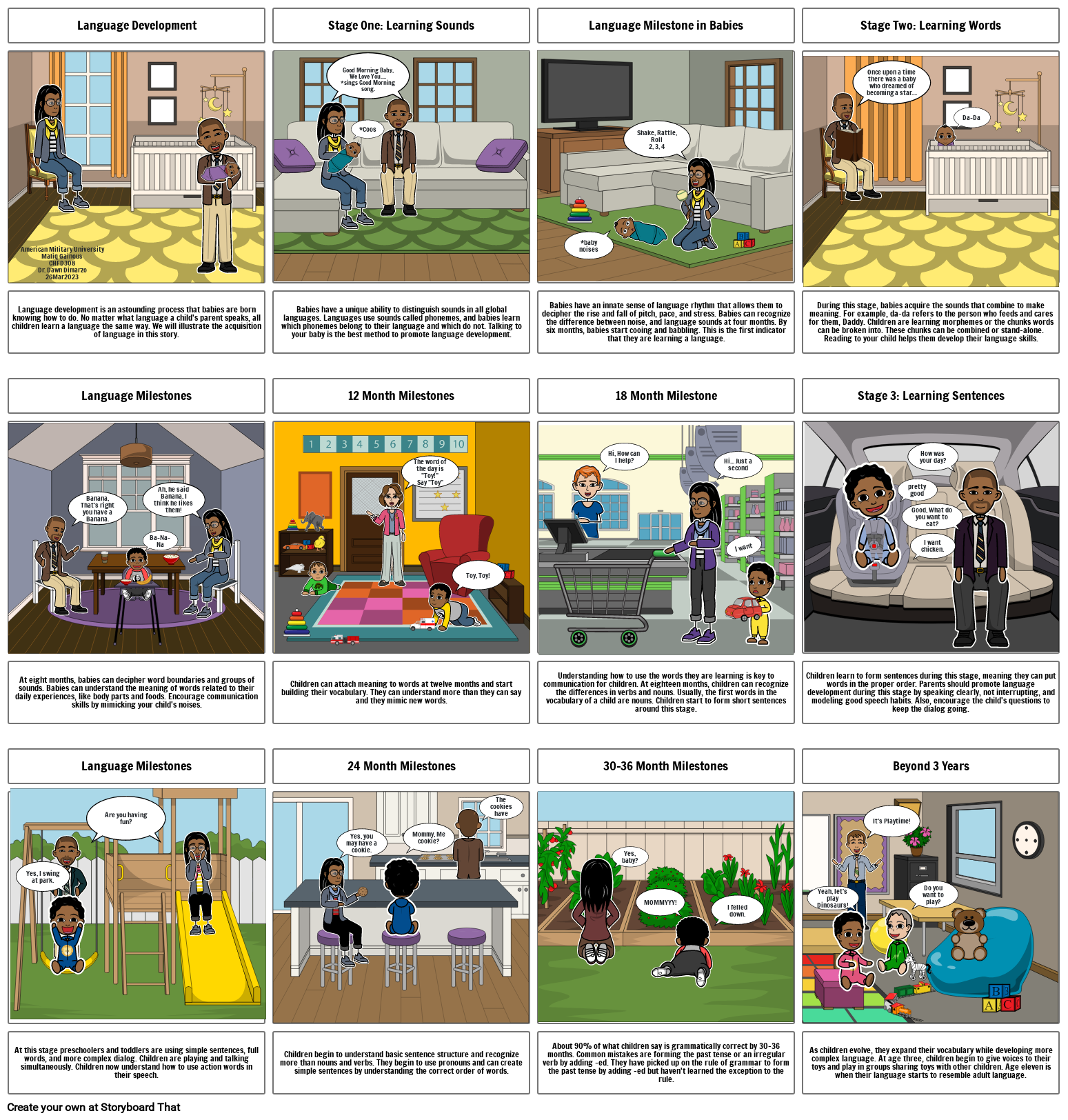Language Development

Storyboard Text
- Language Development
- American Military UniversityMaliq GainousCHFD308Dr. Dawn Dimarzo26Mar2023
- Stage One: Learning Sounds
- Good Morning Baby, We Love You....*sings Good Morning song.
- *Coos
- Language Milestone in Babies
- *baby noises
- Shake, Rattle, Roll2, 3, 4
- Stage Two: Learning Words
- Once upon a time there was a baby who dreamed of becoming a star....
- Da-Da
- Language development is an astounding process that babies are born knowing how to do. No matter what language a child's parent speaks, all children learn a language the same way. We will illustrate the acquisition of language in this story.
- Language Milestones
- Babies have a unique ability to distinguish sounds in all global languages. Languages use sounds called phonemes, and babies learn which phonemes belong to their language and which do not. Talking to your baby is the best method to promote language development.
- 12 Month Milestones
- The word of the day is "Toy!"Say "Toy"
- Babies have an innate sense of language rhythm that allows them to decipher the rise and fall of pitch, pace, and stress. Babies can recognize the difference between noise, and language sounds at four months. By six months, babies start cooing and babbling. This is the first indicator that they are learning a language.
- 18 Month Milestone
- Hi, How can I help?
- Hi... Just a second
- During this stage, babies acquire the sounds that combine to make meaning. For example, da-da refers to the person who feeds and cares for them, Daddy. Children are learning morphemes or the chunks words can be broken into. These chunks can be combined or stand-alone. Reading to your child helps them develop their language skills.
- Stage 3: Learning Sentences
- pretty good
- How was your day?
- At eight months, babies can decipher word boundaries and groups of sounds. Babies can understand the meaning of words related to their daily experiences, like body parts and foods. Encourage communication skills by mimicking your child's noises.
- Banana, That's right you have a Banana.
- Ah, he said Banana, I think he likes them!
- Ba-Na-Na
- Children can attach meaning to words at twelve months and start building their vocabulary. They can understand more than they can say and they mimic new words.
- Toy, Toy!
- Understanding how to use the words they are learning is key to communication for children. At eighteen months, children can recognize the differences in verbs and nouns. Usually, the first words in the vocabulary of a child are nouns. Children start to form short sentences around this stage.
- I want
- Children learn to form sentences during this stage, meaning they can put words in the proper order. Parents should promote language development during this stage by speaking clearly, not interrupting, and modeling good speech habits. Also, encourage the child's questions to keep the dialog going.
- Good, What do you want to eat?
- I want chicken.
- Language Milestones
- Yes, I swing at park.
- Are you having fun?
- 24 Month Milestones
- Yes, you may have a cookie.
- Mommy, Me cookie?
- The cookies have cooled.
- 30-36 Month Milestones
- Yes, baby?
- MOMMYYY!
- I felled down.
- Beyond 3 Years
- Yeah, let's play Dinosaurs!
- It's Playtime!
- Do you want to play?
- At this stage preschoolers and toddlers are using simple sentences, full words, and more complex dialog. Children are playing and talking simultaneously. Children now understand how to use action words in their speech.
- Children begin to understand basic sentence structure and recognize more than nouns and verbs. They begin to use pronouns and can create simple sentences by understanding the correct order of words.
- About 90% of what children say is grammatically correct by 30-36 months. Common mistakes are forming the past tense or an irregular verb by adding -ed. They have picked up on the rule of grammar to form the past tense by adding -ed but haven't learned the exception to the rule.
- As children evolve, they expand their vocabulary while developing more complex language. At age three, children begin to give voices to their toys and play in groups sharing toys with other children. Age eleven is when their language starts to resemble adult language.
Over 30 Million Storyboards Created
No Downloads, No Credit Card, and No Login Needed to Try!
